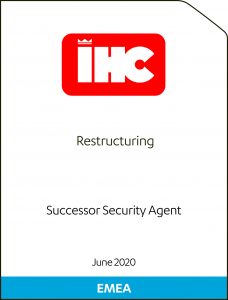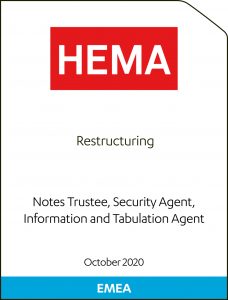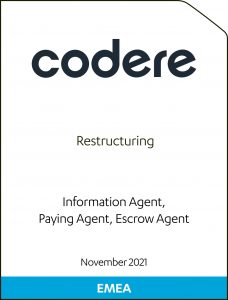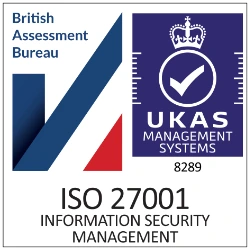
The role of the Security Agent in out of court restructurings of leveraged finance deals

The role of the Security Agent in out of court restructurings of leveraged finance deals
By Theano Manolopoulou and Irena Goldstein
The role of the Security Agent in the out of court restructuring of leveraged finance deals is key because it functions as the administrative conduit among the borrower group and the secured parties on all aspects of the security. The Security Agent plays an active role through the restructuring process with all stakeholders including ad hoc creditor groups and third-party valuation experts. Below we examine some common scenarios in which the Security Agent can prove a valuable resource.
Against a changing market landscape, parties need an expert partner to navigate complex debt restructurings It is important that the Security Agent is independent and conflict free, with the necessary market experience, in order that it can act independently of the borrower or a specific creditor and protect the interests of the entire creditor body. The Security Agent must also have a track record of managing difficult relationships among ad hoc creditor groups during a complex restructuring.
Parameters to consider when appointing a third-party Security Agent
As a best practice, in considering its powers and duties in a restructuring scenario, a Security Agent will take the following steps:
- Examine the deal documentation;
- Identify the commercial requirements of the restructuring;
- Consider any regulatory issues such as tax implications or securities laws; and
- Focus on the distressed disposal provisions in the Intercreditor Agreement and the priority of rankings.
Engaging with steering committees
Ad hoc committees of creditors tend to form when it is evident that the borrower is in financial distress. Notably, acceleration under the LMA is a majority lender decision. The relationship among an ad hoc lenders’ group and the Security Agent can often be delicate, as can be the relationships among different groups of lenders. Some factors that affect the relationship are the identity and proactiveness of the Security Agent in question, and the risk appetite of the specific creditors. It is crucial to remember that the Security Agent must act for the benefit of the creditor body as a whole, regardless of whether the creditors are passive or activist.
A Security Agent will rarely act on its own initiative and will take instructions from the requisite lenders. Ad hoc committees often rely on the Security Agent for communication with the borrower on matters related to the security package. The relationship can be somewhat mechanical, and it will depend on whether the ad hoc committee holds the requisite commitments to instruct the Security Agent to act.
Use of voting rights to stabilise the company
Security over shares includes a package of rights, including the right to vote to approve ordinary and special resolutions of the company. These voting rights are commonly used to appoint or remove directors or to make changes to the constitutional documents of a company.
Typically, the English law security documents, such as the pledge over shares and the intercreditor agreement, would regulate the circumstances in which such a voting rights exercise can occur. Following a lenders’ instruction, the Security Agent would commonly exercise the voting rights to approve resolutions to appoint experienced directors on a Company’s board and/ or to approve amendments to the Articles of a Company to minimise the effect of any disgruntled shareholders on the day-to-day management of the Company post an event of default.
Share pledge enforcements and distressed disposals
The Security Agent’s powers are to a large extent governed by the distressed disposal provisions in the Intercreditor Agreement. While the model LMA intercreditor agreement contains standardised provisions, in practice, the provisions are often the results of complex negotiations.
As a result, distressed disposal provisions vary significantly from deal to deal. Commonly, these provisions empower the Security Agent to release security or guarantees and liabilities if certain criteria are met. These criteria often revolve around value, consents and market testing. The distressed disposal provisions can be bespoke however, including by requiring:
- An instruction of the Instructing Group to release security;
- An instruction of the Instructing Group to release guarantees/liabilities;
- Not allowing the release of primary liabilities at all without the consent of a specific creditor or one class of creditors; or
- Allowing a Distressed Disposal to take place with only the consent of a single creditor/class of creditors.
The Security Agent must have experience navigating the Distressed Disposal process and allowing the Security Agent to rely on the valuation, provides for more certainty on the timeline for the execution of the restructuring. Security Agents that are affiliates of lending or investment institutions are increasingly more conservative when taking distressed disposal actions, and are often not incentivised to take an action that may be contested by a disgruntled shareholder. This can add a lot of levels of approvals and internal bureaucracy to the process, which may frustrate the need to take decisive action.
This is why the selection of an independent Security Agent is so crucial in restructurings. Parties should select a Security Agent that can act pragmatically and commercially, independent of pressure from other business lines, and that has significant experience appointed as a replacement security agent.
Appointing an independent valuation agent
The Security Agent is often asked to exercise its rights to select and appoint an independent valuation agent to assess the value of the collateral in the context of a restructuring. The Security Agent’s rights and powers in this regard are often outlined in the Intercreditor Agreement. Typically, the Security Agent would interview more than one candidate for the role of the independent valuation agent, assess their qualifications and experience in an open dialogue with the lenders, and engage the valuation agent to deliver a valuation report.
Sometimes, the Intercreditor Agreement will require the valuation agent to deliver a fairness opinion. The Security Agent should be comfortable with the selection of the valuation firm, because, for among other reasons, it may rely upon the valuation report when determining the what the realistic best outcome will be for the creditor body in connection with any restructuring or asset disposal.
Debt for equity swaps
A very common debt recovery strategy is a debt for equity swap, in which the lenders exchange outstanding debt for equity in the Company. The Security Agent will act on the lenders’ instruction, provided it has been indemnified to its satisfaction.
Indemnifying the Security Agent
The indemnity provisions in the LMA have been standardised over time, but they are often the subject of much debate and negotiation. The Security Agent will always fall back on the indemnity provisions when considering taking a distressed disposal or other post default action.
Typically, the Security Agent will ask for each obligor to, jointly and severally, promptly on demand, indemnify the Security Agent against any cost, loss or liability incurred by the Security Agent as a result of among others, acting or relying on any notice, instruction or request it believes to be genuine, taking, holding, protecting or enforcing the transaction security or exercising any rights, remedies or authorities vested in the Security Agent or any receiver or delegate.
This indemnity would need to cover the cost of instructing external advisers, such as lawyers, accountants, or tax advisers. The indemnity would typically also allow the Security Agent to, in priority to any payment to the Secured Parties, indemnify itself out of the Security Assets, and to have a lien on the transaction security and any enforcement proceeds.
Selective GLAS work as Security Agent in English restructurings

Gerry Weber (2023)
GLAS is currently acting in various agency capacities (including standstill agent, facility agent and security agent) in the recently announced financial restructuring of sustainable retail clothing company Gerry Weber International AG under a combination of preventive StaRUG proceedings in Essen, Germany, and a self-administration process for an operational restructuring.
On the basis of the Act on the Stabilisation and Restructuring Framework for Enterprises (StaRUG), Gerry Weber International AG filed an application for the initiation of proceedings with the local court in Essen for this purpose on April 19, 2023. The company has announced that the aim of the project is to achieve be a capital reduction to zero, which would also result in the delisting of the shares of Gerry Weber International AG.

VROON Group (2023)
GLAS is currently acting as restructuring agent, global security agent and new facility agent, among other roles, in connection with the restructuring of the debt of Dutch shipping company VROON GROUP BV. As announced in December 2022, the restructuring involves a complex debt for equity swap by which the lenders will take majority control of the group’s principal subsidiary, a haircut on the existing credit facilities, and wind down the existing holding company, Vroon Group BV, on a solvent basis.
The restructuring will be implemented using an English scheme of arrangement, conditional upon a private restructuring plan under the Dutch WHOA being approved by the Dutch court. English court scheme of arrangement meetings commenced in April 2023.

Royal IHC (June 2020)
GLAS took on the successor security agent role and effected a Dutch share pledge enforcement as part of the financial restructuring of Royal IHC.

HEMA
HEMA Group engaged GLAS to work on its complex debt restructuring in 2020, in which its debt was more than halved and its liquidity position greatly improved with an additional bond financing of €42m made available to the company. There was a further Dutch share pledge enforcement as part of a restructuring that was implemented partly by an English scheme of arrangement in late 2020.

Codere
After restructuring in 2020 under a Scheme of Arrangement and with an injection of new financing totalling €250m, Codere undertook a further restructuring in 2021 involving bridge notes financing, a new money injection, and a debt-for- equity swap which saw its business transferred to Codere New Topco SA, a holding company in which the bondholders have a 95% stake. In 2021, we also effected a Luxembourg share pledge enforcement as part of a further consensual restructuring of the company’s debt.
About GLAS
GLAS is an independent and conflict free provider of institutional debt administration services. The company was originally created to provide the market a willing participant in complex loan restructuring transactions where many large institutions are reluctant to take swift and cooperative action.
Our teams both specialise in the loan and bond markets and have significant expertise in restructuring situations. We have a proven track record, having worked on transactions in distress, pre- or post-restructuring or unusual in nature as well as vanilla transactions.
Authors
Theano Manolopoulou, Legal Counsel
Irena Goldstein Senior, Legal Counsel
First published in the international Insolvency & Restructuring Report 2023/24
Contact GLAS
For more information about GLAS and our services, please contact:
GLAS EMEA
GLAS US
GLAS AU















